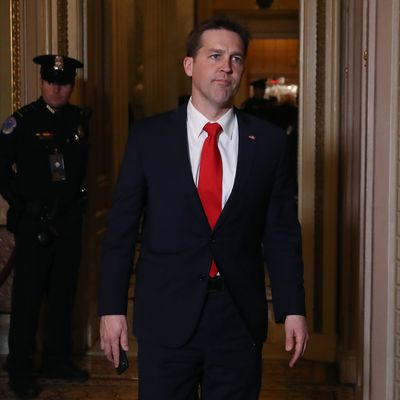
Senate leaders congratulated themselves in the wee hours of Wednesday morning for reaching an agreement on a $2 trillion coronavirus stimulus package. But they were a bit premature. Late on Wednesday night, as this longest day waned, the upper chamber finally passed the $2 trillion coronavirus stimulus after a group of Republican senators pitched a temper tantrum over the bill’s allegedly over-generous treatment of the unemployed.
This churlish freakout unwound all afternoon as Lindsey Graham and Tim Scott of South Carolina, Ben Sasse of Nebraska, and Rick Scott of Florida agitated the air over the average bump-up in unemployment insurance payments agreed upon by the bipartisan negotiators. It would, they argued, pay the unemployed more than low-wage workers in their low-wage states. Chief administration negotiator Steven Mnuchin, other Republican senators, and Trump himself expressed disagreement with the four champions of keeping the unemployed in misery. But after Bernie Sanders threatened to demand tougher accountability standards for the major corporate relief the GOP had insisted on, it was agreed that Sasse would be allowed to offer an amendment cutting the UI benefits before the Senate would proceed to approve the package as everyone had originally expected.
Sasse’s amendment was rejected on a 48-48 vote (60 votes were required for this amendment; its certain failure apparently encouraged maximum Republican support for the uncharitable measure), then the whole bill passed unanimously. The only positive consequence of the delayed action in the Senate is that the House had a full day to figure out how it would proceed on the stimulus legislation. It appears Nancy Pelosi has all but given up on a unanimous consent motion (which would require, as the term suggests, unanimous approval from the entire House, which is unlikely) but may still proceed with a voice vote that would not require members fearful of exposure to COVID-19 to return to Washington. Still, further snags in the process are possible:
All the more reason it’s good that the Senate didn’t go along with the effort to chop unemployment insurance.






























